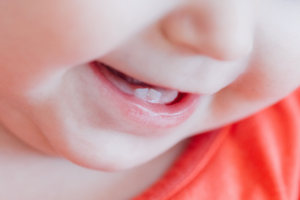Teething (Infants and Young Children)
 Teething is the normal process in which your baby’s first set of teeth (primary teeth) break through the gums. Teething usually begins around six months of age. But it can start as early as three months or as late as 12 months of age. By the time your child is about three years old, they will have all 20 primary teeth. Usually, teeth appear first in the front of the mouth. Lower teeth usually appear one to two months earlier than their matching upper teeth.
Teething is the normal process in which your baby’s first set of teeth (primary teeth) break through the gums. Teething usually begins around six months of age. But it can start as early as three months or as late as 12 months of age. By the time your child is about three years old, they will have all 20 primary teeth. Usually, teeth appear first in the front of the mouth. Lower teeth usually appear one to two months earlier than their matching upper teeth.
Some babies are fussier than usual when they are teething. Symptoms usually begin about three to five days before the tooth shows, and they disappear as soon as the tooth breaks the skin. Many babies don’t seem to be affected by teething.
Signs that baby is teething:
- Drooling.
- Rubbing gums or ears.
- Restlessness.
- Fussy/Irritable.
- Increased sucking.
- Not wanting solid food.
- Slight rise in body temperature.
- Gums look sore, are swollen, red, or have white spots.
- Sore gums.
- Rash on the face from drooling.
- Biting while breastfeeding/feeding.
- Some babies may also have a diaper rash.
If your teething baby seems uncomfortable, consider these simple tips… (click to expand) »
|
CAUTION! Things to avoid:
- A teething ring around a baby’s neck or any other body part could get caught on something and cause choking or strangulation.
- Teething gels can numb the whole mouth and cause trouble swallowing or breathing
- Alcoholic beverages or other medications are dangerous for children and do not soothe teething pain.
When should you call for help?
You can take care of most teething problems at home. Contact the doctor if your baby seems particularly uncomfortable, has a fever, keeps pulling on their ears, or if teething seems to be interfering with eating or drinking.
Services related to this information:
- Contact your Public Health Nurse.
- 811 HealthLine (Newfoundland & Labrador) – Call 811 or 1-888-709-2929 / TTY 1-888-709-3555.

